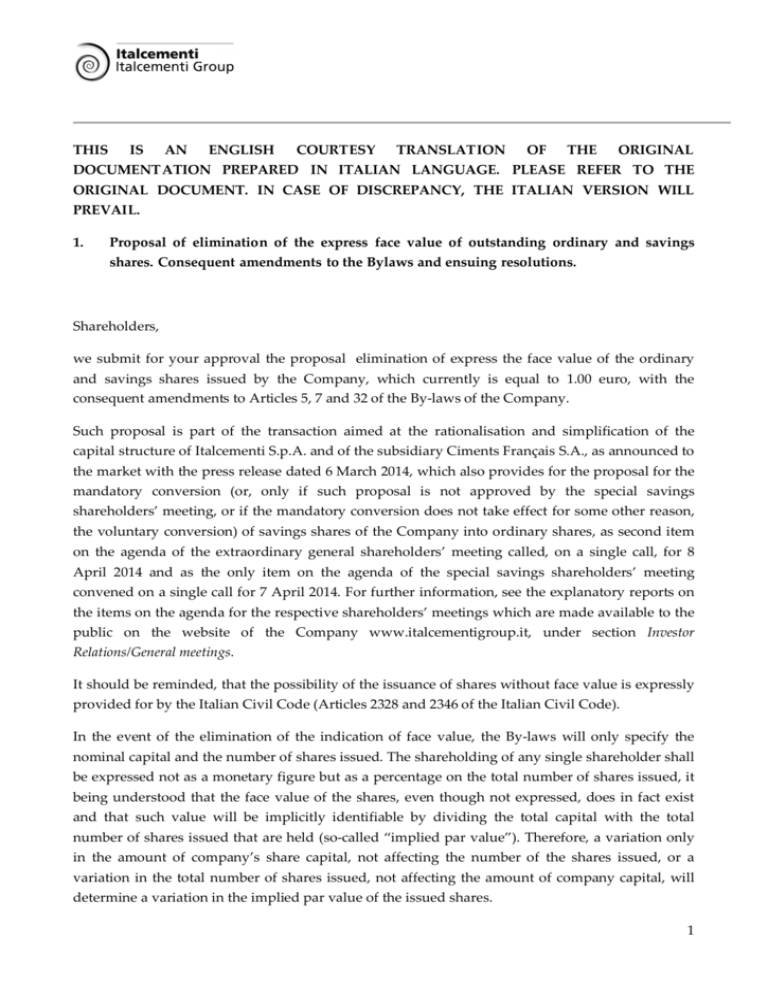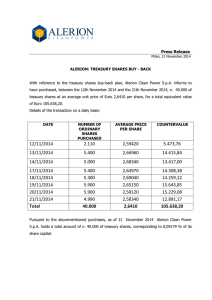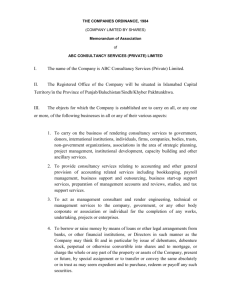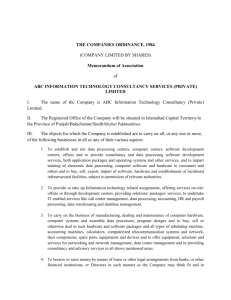Proposal of elimination of the express face value of the outstanding
advertisement

THIS IS AN ENGLISH COURTESY TRANSLATION OF THE ORIGINAL DOCUMENT ATION PREPARED IN ITALIAN LANGUAGE. PLEASE REFER TO THE ORIGINAL DOCUMENT. IN CASE OF DISCREPANCY, THE ITALIAN VERSION WILL PREVAIL. 1. Proposal of elimination of the express face value of outstanding ordinary and savings shares. Consequent amendments to the Bylaws and ensuing resolutions. Shareholders, we submit for your approval the proposal elimination of express the face value of the ordinary and savings shares issued by the Company, which currently is equal to 1.00 euro, with the consequent amendments to Articles 5, 7 and 32 of the By-laws of the Company. Such proposal is part of the transaction aimed at the rationalisation and simplification of the capital structure of Italcementi S.p.A. and of the subsidiary Ciments Français S.A., as announced to the market with the press release dated 6 March 2014, which also provides for the proposal for the mandatory conversion (or, only if such proposal is not approved by the special savings shareholders’ meeting, or if the mandatory conversion does not take effect for some other reason, the voluntary conversion) of savings shares of the Company into ordinary shares, as second item on the agenda of the extraordinary general shareholders’ meeting called, on a single call, for 8 April 2014 and as the only item on the agenda of the special savings shareholders’ meeting convened on a single call for 7 April 2014. For further information, see the explanatory reports on the items on the agenda for the respective shareholders’ meetings which are made available to the public on the website of the Company www.italcementigroup.it, under section Investor Relations/General meetings. It should be reminded, that the possibility of the issuance of shares without face value is expressly provided for by the Italian Civil Code (Articles 2328 and 2346 of the Italian Civil Code). In the event of the elimination of the indication of face value, the By-laws will only specify the nominal capital and the number of shares issued. The shareholding of any single shareholder shall be expressed not as a monetary figure but as a percentage on the total number of shares issued, it being understood that the face value of the shares, even though not expressed, does in fact exist and that such value will be implicitly identifiable by dividing the total capital with the total number of shares issued that are held (so-called “implied par value”). Therefore, a variation only in the amount of company’s share capital, not affecting the number of the shares issued, or a variation in the total number of shares issued, not affecting the amount of company capital, will determine a variation in the implied par value of the issued shares. 1 The elimination of express face value is a flexible tool and it provides administrative simplification, which might be useful, inter alia, in the event of capital transactions, such as that provided for in the second item on the agenda of the extraordinary general shareholders’ meeting, mentioned above, insofar as it eliminates issues connected with the presence of fixed face value as a predetermined figure. Such flexibility is in the interest of the Company, especially in periods of notable volatility in stock exchange prices. It should be further pointed out that the amendment discussed today has already been adopted by a large number of companies listed on a regulated market and the best practice leads newly listed companies to choose, for the purposes of admission, to issue shares without the indication of express face value. The proposed elimination of current face value regards, necessarily, both ordinary shares and savings shares (the latest will be the subject to further and separate proposal of conversion as has been said above). Moreover, it should be highlighted, that the unitary nominal value is relevant to the By-laws of the Company – both for the determination of dividends due to shareholders (ordinary and savings shareholders), and for the identification of certain rights due to savings shareholders on matters of participation in losses and of reductions in capital. More specifically, Article 32, b) of the By-laws of the Company, in its current version, identifies the unitary face value as the base for the determination of dividends due to savings shares, providing that the privilege be determined as a certain percentage of the face value. As a result of the elimination of the reference to unitary face value, it is proposed to replace the current reference with a fixed value determined by applying the percentage currently provided for to the unitary face value of shares as today indicated at 1.00 euro (that corresponds to “implied par value” as at the date of this report). At the distribution of dividends, the savings shares will therefore receive a privilege equal to 5% of 1.00 euro per share (and hence 0.05 euro), with a total increased dividend compared with that attributed to ordinary shares equal to 3% of 1.00 euro per share (and hence of 0.03 euro). On the same prospective, it is proposed to update the rules on the rights of savings shareholders to be subordinated in the participation in losses, providing under Article 7 that any losses of capital do not affect savings shares except for the part that is not covered by the fraction of capital represented by the ordinary shares. Likewise, in the event of the winding-up of the company, the pre-emption entitlement for savings shares on reimbursement of capital, following the proposed amendment to the By-laws, shall no longer refer to their face value but to an amount of up to 1.00 euro per share. This said, it is proposed to amend the By-laws in order to eliminate any mention to the face value of ordinary and savings shares, indicating therefore, in Article 5 the total amount of company’s share capital, the number of shares into which it is divided and removing the indication of their express face value. In addition, amendments will be made – as indicated above to Articles 7 and 32 of the By-laws to reflect the intervening introduction of a numerical value in 2 the regulation of certain savings shares rights (Article 7), with the determination of the dividend due to the shareholders (Article 32, b)) and the determination of the privilege in the winding-up phase (Article 7). In line with the practice applied in similar operations, Article 7 has been reformulated in the last part of its last paragraph to clarify the terms of application in the light of the amendments under examination. Current text Proposed wording Article 5 Article 5 Share capital Share capital The share capital is EUR 282,548,942, broken down into 177,117,564 ordinary shares and 105,431,378 savings shares, with a face value of EUR 1 each. The share capital is EUR 282,548,942, broken down into 177,117,564 ordinary shares and 105,431,378 savings shares, with a face value of EUR 1 each without indication of face value. The share capital can be increased also by Unchanged means of assets in kind or receivables, provided that legal provisions are complied with. In the event the share capital is increased, Unchanged the pre-emptive right can be ruled out within a limit of ten per cent of the preexisting share capital, in compliance with legal provisions. The Board of Directors is given the power so Unchanged that it can, once or various times within the period of five years from the decision of the shareholders at their Extraordinary Meeting dated 17 April 2013: a) under art. 2443 of the Italian Civil Code, increase share capital by a maximum amount of nominal EUR 500,000,000, freeof-charge or by payment, by issuing ordinary and/or savings shares and/or coupons (warrants) for deferred subscribing; b) under art. 2420-ter of the Italian Civil Code, issue bonds to be converted into ordinary and/or savings shares or with 3 rights of purchase and subscription, up to a maximum amount of EUR 500,000,000, within the limits from time to time allowed by law all with the widest powers connected to it, including those of offering the shares and convertible bonds as options or with a warrant under the form as per the second last clause of art. 2441 of the Italian Civil Code; reserve up to a quarter of them under art. 2441 of the Italian Civil Code, last clause; define the provisions and reserves to enter as capital in the event of free-of-charge increase; define issue price, conversion rates, terms and modes for the execution of the operations. With a resolution dated April 19, 2011, the Unchanged extraordinary shareholders’ meeting attributed to the Board of Directors: - the power, pursuant to art. 2443 Italian Civil Code, to increase the share capital on one or more times within a period of five years from the above resolution, for a maximum nominal amount of 6,000,000 euro through the issue, free of charge and/or against consideration, of up to 6,000,000 ordinary and/or savings shares, to be reserved, pursuant to art. 2441 par 8, Italian Civil Code: * for employees of Italcementi S.p.A. and its subsidiaries, in the event of a free of charge issue, * for employees of Italcementi S.p.A. and its subsidiaries, and for employees of its parent companies and of other companies con-trolled by such parent companies, in the event of an offer for subscription, both in Italy and abroad and in accordance with the laws in force in the countries of the 4 beneficiaries; - the power, consequently, to establish the share entitlement rights, to determine the time, procedures, characteristics and conditions of the offer to employees and to establish the share issue price, including any share premium. The Board of Directors’ Meeting of May, 6, Unchanged 2014, in execution of the power granted to it, resolved to increase the share capital in tranches and against consideration up to a maximum amount (including the related share premium) of EUR 450,000,000 (four fifty thousand mil-lions), by issuing a number of shares to be offered as a call option to those entitled. The definition of the exact amount of the share capital increase, the share/s category/ies (ordinary or savings shares or only ordinary shares) to be issued, the issue price, and in particular of the price’s portion to be ascribed to capital and of that to be possibly ascribed to share premium, and as such fixing the number of shares to be issued and the subscription offer ratio, will be defined by a further Board of Directors’ meeting. Article 7 Article 7 Characteristics of savings shares Characteristics of savings shares Savings shares do not have a voting right. Unchanged In the event of a paid increase in share Unchanged capital for which the pre-emptive right has not been cancelled or limited, the owners of savings shares have an optional right on newly issued savings shares or, should these be unavailable or for any difference, on shares of a different category. Deliberations for the issuing of new savings Unchanged shares having the same features of the 5 existing ones, both by means of a share capital increase and by converting shares of a different category, do not require the approval by the meetings of the individual shares categories. In the event of exclusion from the Unchanged negotiations of ordinary and/or savings shares, savings shares retain the rights attributed to them by law and by the Bylaws, unless otherwise provided by the Meeting. When during one year, a dividend has been Unchanged paid on savings shares which is lower than the amount defined in article 32, letter b, the difference is calculated to increase the privileged dividend in the two following years. In the event of distribution of reserves, Unchanged savings shares have the same rights as the other shares. A share capital decrease because of losses does not imply a decrease in the face value of savings shares except for the amount of the loss that exceeds the overall face value of the other shares. A share capital decrease because of losses does not imply a decrease in the face value of affect the savings shares except for the amount of loss that exceeds the overall face value of the other shares is not covered by the fraction of capital represented by the other shares. At the winding up of the company, savings shares have a pre-emption right in the reimbursement of capital for the whole face value. At the winding up of the company, savings shares have a pre-emption right in the reimbursement of capital for the whole face value up to 1,00 euro per share. In the event of share grouping or fractioning (as also in case of transactions affecting the corporate capital where necessary in order not to alter the shareholder rights) the per share amount to which the privileges of savings shares is attached shall be consequentially modified. 6 Article 32 Article 32 Profits – Advance payments on dividends Profits – Advance payments on dividends Net profits resulting from the annual Net profits resulting from the annual financial statements are to be allocated as financial statements are to be allocated as follows: follows: a) 5% to the legal reserve up to the limit a) 5% to the legal reserve up to the limit established by law; established by law; b) to savings shares up to reaching 5% of the face value of the shares, with an overall dividend increased with respect to that of ordinary shares by 3% of the face value of shares; b) to savings shares up to reaching 5% of the face value of the shares the amount of 0.05 per share, with an overall dividend increased with respect to that of ordinary shares by 3% of the face value of shares euro 0.03 per share; c) the remaining amount to shares, unless the Meeting decides special allocations to the c) the remaining amount to shares, unless the extraordinary reserves or to the Board of Meeting decides special allocations to the directors for other purposes. extraordinary reserves or to the Board of directors for other purposes. Advance payments on dividends can be Unchanged distributed within the limits and under the terms envisaged by law. This proposal for the elimination of indication of express face value of the ordinary and savings shares, as well as the introduction of numerical parameters, does not fall into the specific situations which allow ordinary and savings shareholders to exercise the right of withdrawal, pursuant to Article 2437 of the Italian Civil Code, and, therefore, in the event of its approval, the shareholders do not have the right to withdraw from the Company. Further, the proposal is not subject to the approval of the special savings shareholders’ meeting pursuant to Article 146, paragraph 1,b) of the TUF, in the light of the fact that it does not affect any rights of the category. The proposal, where approved, would be effective from the date of the registration of the related resolution on the Companies' Register. Proposed resolution 7 In the light of all the above, the Board of Directors intends to submit for your approval the following proposal for resolution: “The extraordinary general shareholders’ meeting of ITALCEMENTI S.p.A.: - having seen and approved the Report of the Board of Directors and the proposal formulated therein; resolves 1) to eliminate the indication of face value of ordinary shares and of savings shares of ITALCEMENTI S.p.A., pursuant to Articles 2328 and 2346 of the Italian Civil Code. 2) to replace the references, including as percentages, to face value of shares contained in the Articles 7 and 32, b) of the By-laws of the Company with an amount determined on the basis of current implied par value of 1.00 euro; 3) to adjust, in the light of the elimination of the indication of face value of shares, the provisions of Article 7 of the By-laws of the Company where these relate to the right of savings shareholders to be subordinated in participation in losses; 4) to amend, as a result of the above, Articles 5, 7 and 32 of the By-laws of the Company as follows: Article 5 Share capital The share capital is EUR 282,548,942, broken down into 177,117,564 ordinary shares and 105,431,378 savings shares, without indication of face value. The share capital can be increased also by means of assets in kind or receivables, provided that legal provisions are complied with. In the event the share capital is increased, the pre-emptive right can be ruled out within a limit of ten per cent of the pre-existing share capital, in compliance with legal provisions. The Board of Directors is given the power so that it can, once or various times within the period of five years from the decision of the shareholders at their Extraordinary Meeting dated 17 April 2013: a) under art. 2443 of the Italian Civil Code, increase share capital by a maximum amount of nominal EUR 500,000,000, free-of-charge or by payment, by issuing ordinary and/or savings shares and/or coupons (warrants) for deferred subscribing; b) under art. 2420-ter of the Italian Civil Code, issue bonds to be converted into ordinary and/or savings shares or with rights of purchase and subscription, up to a maximum amount of EUR 500,000,000, within the limits from time to time allowed by law, 8 all with the widest powers connected to it, including those of offering the shares and convertible bonds as options or with a warrant under the form as per the second last clause of art. 2441 of the Italian Civil Code; reserve up to a quarter of them under art. 2441 of the Italian Civil Code, last clause; define the provisions and reserves to enter as capital in the event of free-of-charge increase; define issue price, conversion rates, terms and modes for the execution of the operations. With a resolution dated April 19, 2011, the extraordinary shareholders’ meeting attributed to the Board of Directors: - the power, pursuant to art. 2443 Italian Civil Code, to increase the share capital on one or more times within a period of five years from the above resolution, for a maximum nominal amount of 6,000,000 euro through the issue, free of charge and/or against consideration, of up to 6,000,000 ordinary and/or savings shares, to be reserved, pursuant to art. 2441 par 8, Italian Civil Code: * for employees of Italcementi S.p.A. and its subsidiaries, in the event of a free of charge issue, * for employees of Italcementi S.p.A. and its subsidiaries, and for employees of its parent companies and of other companies con-trolled by such parent companies, in the event of an offer for subscription, both in Italy and abroad and in accordance with the laws in force in the countries of the beneficiaries; - the power, consequently, to establish the share entitlement rights, to determine the time, procedures, characteristics and conditions of the offer to employees and to establish the share issue price, including any share premium. The Board of Directors’ Meeting of May, 6, 2014, in execution of the power granted to it, resolved to increase the share capital in tranches and against consideration up to a maximum amount (including the related share premium) of EUR 450,000,000 (four fifty thousand mil-lions), by issuing a number of shares to be offered as a call option to those entitled. The definition of the exact amount of the share capital increase, the share/s category/ies (ordinary or savings shares or only ordinary shares) to be issued, the issue price, and in particular of the price’s portion to be ascribed to capital and of that to be possibly ascribed to share premium, and as such fixing the number of shares to be issued and the subscription offer ratio, will be defined by a further Board of Directors’ meeting. Article 7 Characteristics of savings shares Savings shares do not have a voting right. 9 In the event of a paid increase in share capital for which the pre-emptive right has not been cancelled or limited, the owners of savings shares have an optional right on newly issued savings shares or, should these be unavailable or for any difference, on shares of a different category. Deliberations for the issuing of new savings shares having the same features of the existing ones, both by means of a share capital increase and by converting shares of a different category, do not require the approval by the meetings of the individual shares categories. In the event of exclusion from the negotiations of ordinary and/or savings shares, savings shares retain the rights attributed to them by law and by the By-laws, unless otherwise provided by the Meeting. When during one year, a dividend has been paid on savings shares which is lower than the amount defined in article 32, letter b, the difference is calculated to increase the privileged dividend in the two following years In the event of distribution of reserves, savings shares have the same rights as the other shares. A share capital decrease because of losses does not affect the savings shares except for the amount of loss that is not covered by the fraction of capital represented by the other shares. At the winding up of the company, savings shares have a pre-emption right in the reimbursement of capital up to 1,00 euro per share. In the event of share grouping or fractioning (as also in case of transactions affecting the corporate capital where necessary in order not to alter the shareholder rights) the per share amount to which the privileges of savings shares is attached shall be consequentially modified. Article 32 Profits – Advance payments on dividends Net profits resulting from the annual financial statements are to be allocated as follows: a) 5% to the legal reserve up to the limit established by law; b) to savings shares up to reaching the amount of 0.05 per share, with an overall dividend increased with respect to that of ordinary shares by euro 0.03 per share; c) the remaining amount to shares, unless the Meeting decides special allocations to the extraordinary reserves or to the Board of directors for other purposes. Advance payments on dividends can be distributed within the limits and under the terms envisaged by law. 10 5) to grant a mandate to legal representatives in office from time to time, acting severally and not jointly, to provide, including through proxies, for what is requested, necessary or useful to enforce the resolutions above, as well as to perform the formalities necessary for the resolutions to be filed with the companies’ register, with the power to introduce possible variations, adjustments or additions thereto that are not of a substantial nature and that are appropriate or required by the competent Authorities, including at the time of registration and, in general, to carry out all necessary activities in order to completely enforce the resolutions themselves, with each and any powers that are necessary and appropriate for such purpose, excluding and excepting none as well as for filing and advertising in accordance with the law, of the updated text of the By-laws of the company with the amendments, following previous resolutions as well as following to their execution and implementation”. Bergamo, 6 March 2014 For the Board of Directors The Chairman of the Board of Directors 11








